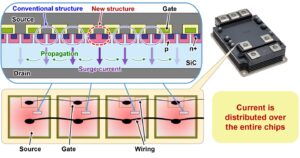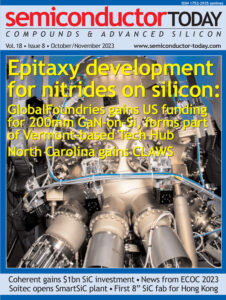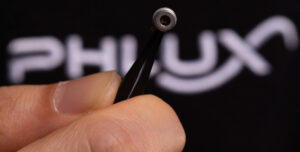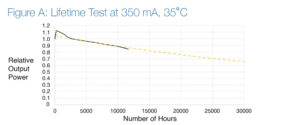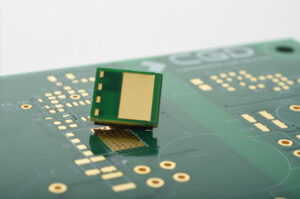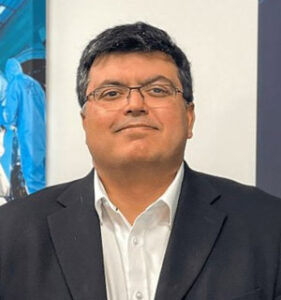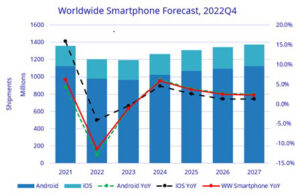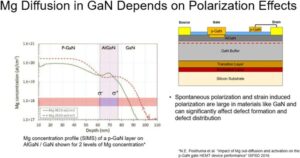News: Suppliers
24 January 2024
UK-based Oxford Instruments says that its atomic layer deposition (ALD) equipment has been installed at an “award-winning UK micro-LED provider” to support the latest consumer-immersive reality products and display devices. The system is used to deposit high-K dielectric ultra-thin films for high-density, very high-brightness, low-power and high-frame-rate RGB pixel arrays for consumer augmented-, virtual- and mixed-reality devices and smart watches.
The increase in demand for smaller-form-factor wearable devices, with high-definition displays, is fuelling significant growth in research for this sector. Micro-LEDs are able to deliver die pitch sizes of <10µm and therefore enable the miniaturization of consumer wearable display devices, while still maintaining high image resolution. As pitch size decreases, perimeter-to-area ratio proportionally increases, and the damage introduced during the mesa formation and isolation step becomes a performance limiting factor.
At the 14th International Conference on Nitride Semiconductors (ICNS 2023) in Fukuoka, Japan in mid-November, numerous presentations were given highlighting the benefits of plasma ALD for counteracting damage. Plasma ALD was also shown to significantly increase external quantum efficiency, with ALD described as critical to miniature light emitters.
“Our low-damage plasma ALD technology is gaining market traction on our 200mm-capable platform,” says Oxford Instruments’ strategic business development director Klaas Wisniewski. “Our plasma ALD high-K passivation solution is optimized for smaller dies with smaller active areas, and was shown in some cases by our customers at ICNS to double external quantum efficiency,” he adds. “Small-form-factor high-performance micro-LEDs are a critical component in head-mounted displays for virtual reality, and other advanced devices such as smart watches, and our technology is enabling some of the most desirable and advanced consumer devices.”
Oxford Instruments is attending the SPIE Photonics West 2024 event in San Francisco (30 January–1 February), where it will share its latest optoelectronics processes for augmented, virtual and mixed reality and quantum, as well as data transfer applications for artificial intelligence and machine learning.
Oxford Instruments launches high-rate ALD research system
- SEO Powered Content & PR Distribution. Get Amplified Today.
- PlatoData.Network Vertical Generative Ai. Empower Yourself. Access Here.
- PlatoAiStream. Web3 Intelligence. Knowledge Amplified. Access Here.
- PlatoESG. Carbon, CleanTech, Energy, Environment, Solar, Waste Management. Access Here.
- PlatoHealth. Biotech and Clinical Trials Intelligence. Access Here.
- Source: https://www.semiconductor-today.com/news_items/2024/jan/oipt-240124.shtml
- :has
- :is
- :where
- 2023
- 2024
- 30
- a
- Able
- active
- Adds
- advanced
- also
- an
- and
- applications
- ARE
- areas
- artificial
- artificial intelligence
- AS
- At
- atomic
- attending
- augmented
- becomes
- been
- benefits
- business
- business development
- by
- cases
- component
- Conference
- consumer
- critical
- Customers
- damage
- data
- decreases
- deliver
- Demand
- deposit
- described
- Development
- Devices
- Die
- Director
- Display
- displays
- double
- during
- efficiency
- enable
- enabling
- equipment
- Event
- external
- factor
- February
- films
- For
- formation
- Francisco
- gaining
- given
- Growth
- he
- High
- high-definition
- high-performance
- highlighting
- HTTPS
- image
- in
- Increase
- Increases
- instruments
- Intelligence
- International
- introduced
- isolation
- IT
- items
- ITS
- January
- Japan
- latest
- launches
- layer
- learning
- light
- machine
- machine learning
- maintaining
- maker
- Market
- mixed
- mixed reality
- most
- numerous
- of
- on
- optimized
- Other
- our
- Oxford
- performance
- Pitch
- Pixel
- Plasma
- platform
- plato
- Plato Data Intelligence
- PlatoData
- Presentations
- processes
- Products
- Quantum
- ratio
- Reality
- related
- research
- Resolution
- RGB
- San
- San Francisco
- says
- sector
- Semiconductors
- Share
- shown
- significant
- significantly
- Size
- sizes
- smaller
- smart
- solution
- some
- Step
- Still
- Strategic
- strategic business
- such
- supplies
- support
- system
- Technology
- that
- The
- therefore
- this
- to
- traction
- transfer
- Uk
- used
- very
- Virtual
- Virtual reality
- was
- watches
- wearable
- wearable devices
- WELL
- were
- West
- while
- will
- with
- zephyrnet


